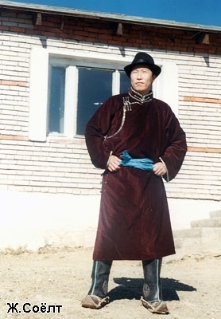 |
|
| J.Soyolt |
ULAN BATOR (Reuters) - Mongolians in China are in danger of losing their identity, 40 years after a purge that claimed the lives of many of the community's leaders, an activist recently released from a Chinese detention centre said.
Jiranbayariin Soyolt, who seeks more rights for Mongolians in China, was jailed for over five months after being detained in Beijing in January. He was released without charge in June.
"Those overseas who worry about minority cultures should also worry about Mongolians. We too are being absorbed into Chinese culture, maybe even more so than Tibetans or Uighurs," Soyolt said in an interview at a popular restaurant in Ulan Bator.
"We don't make a fuss, but we are in even more danger of being smothered."
Soyolt's father, a local official in the arid west of Inner Mongolia, was one of tens of thousands killed during a purge of ethnic Mongolian Communist Party cadres and intellectuals in 1968, during the peak of the Cultural Revolution.
Beijing suspected Mongolians of having formed the "Inner Mongolian People's Party" that would seek independence or unity with Mongolia, which was then in the grip of the Soviet Union.
"A lot of people died in the Cultural Revolution so people don't have the spine to resist now. The one or two who do, have been imprisoned."
Mongolia, under Genghis Khan in the 13th century, was the centre of one of the world's greatest empires. After centuries of expansion and division, it declared independence from China in 1921 and is now eyed for its vast deposits of gold, copper and coal. Inner Mongolia is an "autonomous region" of China.
Mongolians say they are China's overlooked minority, without a champion like the Tibetan's Dalai Lama or the geopolitical importance of the Muslim Uighurs on the western frontier.
Most young Mongolians in the industrial cities of Inner Mongolia speak only Mandarin, and many consider themselves Chinese, Soyolt said. Mongolian language and culture is also fading in the poorer countryside.
One of the few dissidents, bookshop owner Hada, was jailed for 15 years from 1996 for separatism, spying and his support for the Southern Mongolian Democratic Alliance, which sought greater rights for ethnic Mongolians.
Since the founding of the People's Republic of China in 1949, designated autonomous regions are supposed to grant other ethnic groups control over their own affairs in their own homelands. But Han Chinese usually hold the top government positions, while mining, industry and large farms are usually controlled by state-owned firms or Han businessmen.
Decades of Han migration have made Chinese Mongolians a minority in their own land. They officially comprise 20 percent of the almost 24 million population of Inner Mongolia.
"Right now, all powerful positions are held by the Han. With true autonomy, our culture, our own business people, could flourish," Soyolt said.
"I do recognise that Inner Mongolia has developed economically, but there are no ethnic rights. We Mongolians are in an unequal situation, and we don't have the right to speak."
College made Soyolt aware that Mongolians had been marginalised in their own home. He was active in student movements for Mongolian rights in the 1980s, before moving to Mongolia in 1991 and became a Mongolian citizen in 1997.
His decent treatment while detained, and ultimate release, were due to pressure from Mongolia's Foreign Ministry. But it also shows progress in China, Soyolt said.
"Five years ago, I would have been tortured and charged with inciting splittism, with a term of 10 years to life. So I think there's been real improvement."







